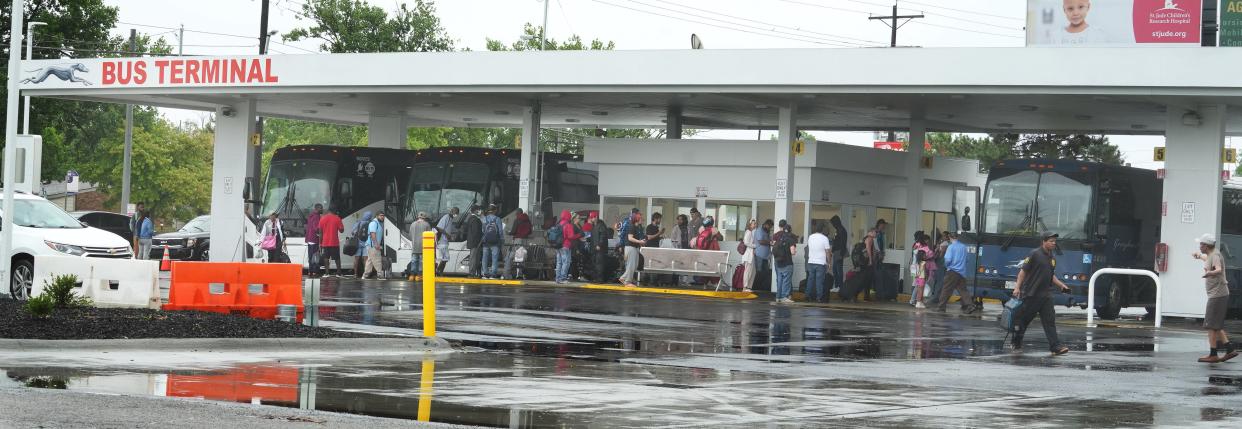Columbus cites 'false pretense' and deception on new Greyhound station; demands fixes

- Oops!Something went wrong.Please try again later.
The city of Columbus has given the operators of the new Greyhound station in the Hilltop area 30 days to change its operations and submit additional plans. If the orders aren't met, the new terminal could face sanctions, including potential closure, in Franklin County Environmental Court.
And Mayor Andrew Ginther in a letter to Greyhound operators said the location is inappropriate either way.
The orders, outlined in a July 27 "Notice of violation and order to correct," contradict the city's previous hands-off approach to Greyhound's move from Downtown Columbus to its current site, 845 North Wilson Road, just south of Interstate 70.
The city has said that Greyhound and its partner, Independence, Ohio-based Barons Bus Lines, failed to fully disclose its intentions for the Wilson Road site, a former gas station.
In a July 17 letter to Barons and Greyhound, Ginther said the city approved the original plans "under false pretense" and that "details of the scope and scale of operations were misrepresented."
In the letter, Ginther orders health and safety upgrades, including "increasing safety personnel, installing semi-permanent, sanitary and temperature-controlled restrooms and limiting the number of passengers boarding/deboarding."
In a follow up July 28 letter to Thomas Goebel, Baron's president, Ginther is more direct:
"Regardless of your intentions, and despite actions taken to mitigate the negative impact on the neighborhood, the operation of an inter-city bus terminal at this location is not compatible with the surrounding community."
Ginther asks Goebel to use teams of two special duty police officers instead of private security and have a police cruiser on-site at all times.
If the suggestions are ignored, Ginther wrote, "We intend to use every available tool to force you to cease operations and relocate operations to a suitable site."
In the Greyhound operation's most recent plans to demolish a car wash and convert it into additional seating area for up to 100 with restrooms, the company failed to submit a site plan and was never given a certificate of occupancy.
That sparked the July 27 orders to comply. Among the problems a code enforcement officer allegedly found:
The Greyhound sign was installed on a building canopy without applying for a graphics permit.
A bus hit and damaged the main terminal building, which had not been repaired.
The property is being used "in a much more intense use than initially portrayed."
A special permit is needed to install portable running water restrooms.
Initially, Greyhound and Barons said the site would be used for ticket sales, with just 17 customers per day, said Anthony J. Celebrezze III, deputy director of the Columbus Department of Building and Zoning Services.
In the first week of July, when the terminal began operating, the city called the plans a private business decision. The operators, Wilson 845 LLC, owned by Barons, which operates jointly with Greyhound, had submitted property building plans and met zoning requirements, according to the city.
But once complaints from neighbors began and media reports followed, the city looked more closely, said Daniel Fagan, chairman of the Greater Hilltop Area Commission.
A July 18 meeting, which about 100 residents attended, raised noise, traffic and safety issues.
"I'd like to boldly say that we made the difference. We were able to get the details and concerns brought forward," Fagan said.
"I don't think the city knew the entire use of the property. … It was folks kind of reviewing it in their silos," Fagan said. "I think this was a huge difference. It wasn't just a bunch of people raising pitchforks and storming the castle."
Fagan and others believe there are far better locations for a bus terminal, including the former Westland Mall, Great Western Shopping Center and Hollywood Casino Columbus, he said.
"You look at abandoned storefronts, large parking lots, place where maybe something could be constructed ... and not in the middle of a residential neighborhood."
Read More: New Columbus Greyhound terminal fuels anger, concern from neighbors, passengers
Zachary J. Whitt, who lives near the new terminal, said the city was slow to react.
"The city's probably back-tracking on this and doing some damage control," he said. "I think the city rushed this through without appropriate attention to detail — at all levels of the city."
Joe Motil, who is running against Ginther for mayor, agrees.
"They have all known that this terminal was going in," Motil said. "And they allowed it to operate without an occupancy permit, until I pointed it out. I basically caught them.
"They (city officials) have knowingly and unlawfully allowed the terminal to operate without a permit."
Celebrezze said the oversight and permitting process was done by the book.
"Our processes all have certain deadlines. … We did find problems, and we sent corrections letters, and we got responses in days. They wanted to be responsive because they needed a place to be," Celebrezze said of Greyhound, which did not return calls for comment from the Dispatch.
"We didn't have the benefit of knowing everything we know now," said Celebrezze. "Everything (Greyhound/Baron officials) portrayed to the building and zoning department said ticket sales, not bus terminal."
dnarciso@dispatch.com
This article originally appeared on The Columbus Dispatch: Columbus says new Greyhound station inappropriate, even with changes

